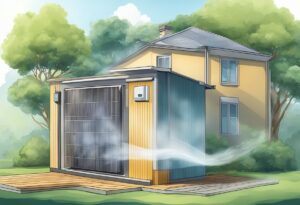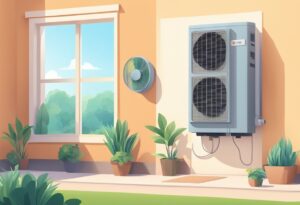Many people believe that running their air conditioner 24/7 is the best way to keep their homes cool and comfortable. However, there are many myths and misconceptions surrounding this practice. In this article, we will explore the truth about running your air conditioner 24/7 and provide you with the information you need to make an informed decision.

Firstly, it is important to understand that running your air conditioner 24/7 can have both positive and negative effects. On the one hand, it can help to maintain a consistent temperature throughout your home and prevent your air conditioner from working too hard to catch up when you turn it back on after a long period of inactivity. On the other hand, it can lead to higher energy bills and unnecessary wear and tear on your air conditioning unit.
So, what is the truth about running your air conditioner 24/7? The answer depends on a number of factors, including the climate in which you live, the size of your home, the efficiency of your air conditioning unit, and your personal preferences. In the following sections, we will take a closer look at each of these factors and provide you with the information you need to determine whether running your air conditioner 24/7 is the right choice for you.
Understanding Air Conditioning Basics

How AC Systems Work
Air conditioning systems work by removing heat and moisture from the air in a room or building. The process involves a refrigerant that absorbs heat and moisture from the indoor air and then releases it outside. The refrigerant is circulated through a closed loop of pipes and coils, which are connected to an indoor unit and an outdoor unit.
The indoor unit contains an evaporator coil that cools and dehumidifies the air. The outdoor unit contains a compressor that pressurizes the refrigerant and a condenser coil that releases the heat and moisture that was absorbed from the indoor air. The two units are connected by a refrigerant line that allows the refrigerant to flow between them.
Types of Air Conditioners
There are several types of air conditioning systems, including window units, split systems, and central air conditioning. Window units are designed to cool a single room and are typically the most affordable option. Split systems consist of an indoor unit and an outdoor unit and can cool multiple rooms. Central air conditioning systems are the most expensive option but are designed to cool an entire building.
Each type of air conditioning system has its own advantages and disadvantages. Window units are easy to install and can be removed when not in use, but they are not very efficient and can be noisy. Split systems are more efficient and can cool multiple rooms, but they require professional installation and can be expensive. Central air conditioning systems are the most efficient and can cool an entire building, but they are also the most expensive and require professional installation.
The Impacts of Continuous AC Use

Energy Consumption
Running your air conditioner 24/7 can lead to a significant increase in your energy consumption. This means that your electricity bills will be much higher compared to using your AC only when necessary. According to the US Department of Energy, air conditioning accounts for about 6% of the total electricity use in the United States. This means that running your AC continuously can have a significant impact on your energy bills and the environment.
Wear and Tear on Components
Continuous use of your air conditioner can also lead to wear and tear on its components. This can result in the need for more frequent repairs and replacements, which can be costly. The compressor, evaporator, and condenser are some of the components that are most affected by continuous use. The compressor is particularly vulnerable to wear and tear as it is responsible for cooling the refrigerant and circulating it through the system.
To minimize the impact of continuous AC use on your system, it is important to have it maintained regularly. This includes cleaning the filters, checking the refrigerant levels, and inspecting the components for signs of wear and tear. It is also recommended to use a programmable thermostat to regulate the temperature and reduce the amount of time the AC runs when it is not needed.
In conclusion, while running your air conditioner 24/7 may seem like a convenient option, it can have significant impacts on your energy bills and the lifespan of your AC system. It is important to use it wisely and maintain it regularly to ensure optimal performance and efficiency.
Evaluating Cost Implications
Short-Term Costs
Running an air conditioner 24/7 will result in higher electricity bills. In the short-term, the cost of running an air conditioner constantly can be significant, especially during hot summer months. The exact cost will depend on factors such as the size of the air conditioner, the efficiency of the unit, and the local electricity rates. However, it is safe to say that running an air conditioner 24/7 will increase energy consumption and add to the monthly bill.
Long-Term Savings Versus Expenses
While running an air conditioner 24/7 will increase short-term costs, there are potential long-term savings to consider. For example, keeping the air conditioner running constantly can help maintain a consistent temperature, which can reduce wear and tear on the unit. Additionally, running the air conditioner constantly can help reduce humidity levels, which can help prevent mold growth and other moisture-related problems.
On the other hand, running an air conditioner 24/7 can also lead to increased maintenance costs and a shorter lifespan for the unit. Over time, constant use can cause parts to wear out more quickly, which can lead to more frequent repairs or even the need for a replacement unit.
Ultimately, the decision to run an air conditioner 24/7 will depend on a variety of factors, including personal comfort preferences and budget constraints. It is important to weigh the short-term costs against the potential long-term savings and expenses before making a decision.
Environmental Considerations
Carbon Footprint
Running your air conditioner 24/7 can have a significant impact on the environment. The amount of electricity used by an air conditioner can contribute to the release of carbon dioxide and other greenhouse gases into the atmosphere. This can lead to global warming and other environmental issues.
To reduce the carbon footprint of your air conditioning system, it is important to use it efficiently. This includes setting the thermostat to a reasonable temperature and turning it off when it is not needed. Additionally, it is recommended to use energy-efficient air conditioning units that are designed to reduce energy consumption.
Refrigerants and the Ozone Layer
Another environmental consideration when running your air conditioner 24/7 is the type of refrigerant used in the system. Many older air conditioning units use refrigerants that contain chlorofluorocarbons (CFCs) or hydrochlorofluorocarbons (HCFCs), which are known to deplete the ozone layer.
To address this issue, newer air conditioning units use refrigerants that are less harmful to the environment, such as hydrofluorocarbons (HFCs). However, even HFCs can contribute to global warming if they are released into the atmosphere.
To minimize the environmental impact of your air conditioning system, it is important to properly maintain it and ensure that any leaks are repaired promptly. Additionally, when it is time to replace your air conditioning unit, consider investing in a model that uses a more environmentally friendly refrigerant.
Health and Comfort Factors
Air Quality and Circulation
Running your air conditioner 24/7 can have a positive impact on the air quality and circulation in your home. When the air conditioner is running, it pulls in air from outside and filters it, removing pollutants such as dust, pollen, and pet dander. This can be especially beneficial for individuals with allergies or respiratory issues.
In addition, running the air conditioner constantly can help circulate the air in your home, preventing stagnant air from accumulating and reducing the risk of mold growth. Proper air circulation can also help regulate humidity levels, which can improve indoor air quality and reduce the risk of respiratory infections.
Temperature Regulation and Sleep
Maintaining a consistent temperature in your home can have a significant impact on your comfort and quality of sleep. Running your air conditioner 24/7 can help regulate the temperature and prevent fluctuations that can disrupt sleep.
In addition, a cooler temperature can promote better sleep by helping to lower your body temperature. When you sleep, your body naturally cools down, and a cooler environment can help facilitate this process. However, it’s important to note that the ideal temperature for sleep can vary from person to person, and it’s important to find a temperature that works best for you.
Overall, running your air conditioner 24/7 can have several health and comfort benefits, including improved air quality and circulation, and better temperature regulation for a good night’s sleep.
Maintenance and Efficiency Tips
Regular Maintenance Schedules
To keep your air conditioner running efficiently, it is important to follow a regular maintenance schedule. This includes cleaning or replacing the air filter every month, checking and cleaning the evaporator and condenser coils annually, and making sure the drain line is clear of any obstructions. It is also recommended to have a professional technician perform a thorough inspection and tune-up of your air conditioning unit at least once a year.
By following a regular maintenance schedule, you can ensure that your air conditioner is running at its best and avoid costly repairs down the line. Additionally, a well-maintained air conditioner will operate more efficiently, which can save you money on your energy bills.
Upgrading Insulation and Sealing Leaks
Another way to increase the efficiency of your air conditioner is by upgrading your home’s insulation and sealing any leaks. This will help to keep cool air inside during the summer months and prevent hot air from entering your home.
One way to check for leaks is to use a smoke pencil or incense stick and hold it near doors, windows, and other potential areas of air leakage. If the smoke or incense is blown away or sucked in, this indicates a leak that needs to be sealed.
In addition to sealing leaks, upgrading insulation in your attic, walls, and floors can also help to keep your home cooler and reduce the workload on your air conditioner. This can be a cost-effective way to increase the efficiency of your air conditioning unit and save money on your energy bills.
By following these maintenance and efficiency tips, you can keep your air conditioner running smoothly and save money on your energy bills.
Alternatives to Running AC Non-Stop
Programmable Thermostats
One way to reduce the amount of time your air conditioner runs is to install a programmable thermostat. These thermostats allow you to set different temperatures for different times of the day. For example, you can set the temperature to be higher during the day when no one is home and lower in the evening when people are home. This can help save energy and reduce your electricity bill.
Natural Cooling Techniques
Another way to reduce the amount of time your air conditioner runs is to use natural cooling techniques. One way to do this is to open windows and doors to allow fresh air to circulate through your home. You can also use ceiling fans or portable fans to help circulate the air. This can help reduce the temperature in your home without using your air conditioner.
Another natural cooling technique is to use shade to block out the sun. You can use curtains, blinds, or shades to block out the sun’s rays during the hottest parts of the day. This can help keep your home cooler and reduce the amount of time your air conditioner runs.
Overall, there are several alternatives to running your air conditioner non-stop. By using programmable thermostats and natural cooling techniques, you can reduce your energy consumption and save money on your electricity bill.
When to Choose Continuous Operation
There are certain situations where running your air conditioner 24/7 may be the best option. Here are some scenarios where continuous operation may be necessary:
Extreme Weather Conditions
During periods of extreme heat, it may be necessary to run your air conditioner continuously to maintain a comfortable temperature inside your home. This is especially true if you have young children or elderly individuals living with you, as they may be more susceptible to heat-related illnesses.
In addition, if you live in an area with high humidity, running your air conditioner continuously can help to reduce the moisture levels in your home, which can prevent the growth of mold and mildew.
Special Circumstances
There are certain situations where running your air conditioner continuously may be necessary due to special circumstances. For example, if you have a home server or other electronic equipment that generates a lot of heat, running your air conditioner continuously can help to prevent overheating and damage to your equipment.
In addition, if you have pets that are sensitive to heat, running your air conditioner continuously can help to keep them comfortable and prevent heat exhaustion.
It is important to note that running your air conditioner continuously can increase your energy bills. However, in some cases, the benefits may outweigh the costs. If you are unsure whether continuous operation is necessary, it is best to consult with a professional HVAC technician who can provide you with personalized advice based on your specific situation.

0 Comments